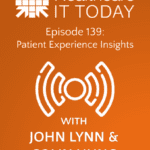It’s not a huge surprise that the week of the ONC Meeting, they would make a number of big announcements for those of us in health IT. The first was the announcement of the first official QHINs as part of TEFCA and the 2nd announcement was the final HTI-1 rule. Let’s dive into both and what you should know.
QHINs and TEFCA
The QHIN announcement really was around which organizations have officially become QHINs as compared with the organizations that were part of the initial QHIN onboarding process. Here are the 5 QHINs that have been officially designated Qualified Health Information Networks (QHINs) today after completing the TEFCA onboarding process:
- eHealth Exchange
- Epic Nexus
- Health Gorilla
- KONZA
- MedAllies
The two companies that aren’t on the above list that are going through the QHIN onboarding process are CommonWell Health Alliance and Kno2. While it’s notable that they haven’t become officially designated as QHINs yet, I think that as long as they finish the process in the next few months it won’t be a big issue. Both organizations have announced their intent to complete the QHIN onboarding process. Check out CommonWell’s press release and Kno2’s timeline. The CommonWell delay is really not surprising given they just changed their technical service provider. If they’re still not QHINs a year from now, then maybe there’s something to write home about.
The other thing to realize is that this is just the start of organizations becoming QHINs. I expect we’ll see many more health IT companies become QHINs. We already know of Surescripts intent to become a QHIN and eClinicalWorks just announced their intent to become a QHIN as well. If you want more details on TEFCA and QHINs, check out this two-pager and we’ll be working on talking with some of the official QHINs and those that are still working on it at the ONC conference. This is a big step forward for QHINs who can now start sharing health data. We’ll see how effective it is at solving the healthcare interoperability problem.
Loyd Bittle, Founder and CEO at Innovar Healthcare offered this interesting perspective on the announcement that I’ve heard from other interoperability providers, “We recognize the effort and intention behind the recent QHIN announcements. However, we believe that the value added by QHINs overlaps significantly with what existing networks and Health Information Exchanges (HIEs) already offer. While QHINs are being highlighted as a significant advancement, we are keen to understand the strategies for their practical implementation and monetization. Furthermore, the exclusion of HIEs from this dialogue and the choices in technology and protocols by the ONC might not fully align with the rapidly evolving nature of our industry. In our view, this approach could potentially limit the progress towards open, adaptable networks, which is crucial for the future of our industry. We remain committed to working collaboratively towards solutions that truly advance our sector and serve the wider community.”
HTI-1 Final Rule
Appropriately, we’ve been breaking down what health IT and EHR vendors need to expect when it comes to HTI-1 in our Healthcare Regulatory Talk series. So, the final HTI-1 rule shouldn’t come as too much of a surprise to readers of Healthcare IT Today. That said, it’s always interesting to see what changes there are in the final rule. You can see the HTI-1 announcement by HHS and also check out the 916 page HTI-1 final rule.
We’ll be combing through the final rule and will give a full breakdown once we can dive into the details, but here’s a quick summary of what’s included:
- Algorithm Transparency: Establishes first of its kind transparency requirements for the artificial intelligence (AI) and other predictive algorithms that are part of certified health IT. ONC-certified health IT supports the care delivered by more than 96% of hospitals and 78% of office-based physicians around the country. HHS’ leading-edge regulatory approach will promote responsible AI and make it possible for clinical users to access a consistent, baseline set of information about the algorithms they use to support their decision making and to assess such algorithms for fairness, appropriateness, validity, effectiveness, and safety.
- USCDI Version 3: Adopts the United States Core Data for Interoperability (USCDI) Version 3 (v3) as the new baseline standard within the ONC Health IT Certification Program (Certification Program) as of January 1, 2026. Developers of certified health IT will also have the ability to move to USCDI v3 sooner. USCDI v3 includes updates to prior USCDI versions focused on advancing more accurate and complete patient characteristics data that could help promote equity, reduce disparities, and support public health data interoperability.
- Enhanced Information Blocking Requirements: Revises certain information blocking definitions and exceptions to support information sharing, and adds a new exception to encourage secure, efficient, standards-based exchange of electronic health information under the Trusted Exchange Framework and Common AgreementSM (TEFCASM).
- New Interoperability-Focused Reporting Metrics for Certified Health IT: Implements the 21st Century Cures Act’s requirement to adopt a Condition of Certification (the “Insights Condition”) for developers of certified health IT to report certain metrics as part of their participation in the Certification Program. These metrics will give more insight into how certified health IT is used in support of care delivery.
What do you think of the HTl-1 Final rule? Anything surprise you? How about the QHIN announcement? Let us know what you think of these two pieces of news coming out of HHS and ONC in the comments and on social media.













